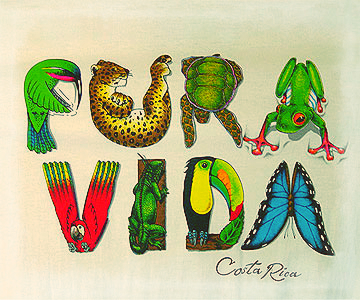

It's just like calling a girl 'dude' in English.

It is a little rude to call a female 'mae' but it happens. A feminine form, rarely heard, is majita. The national debate over this word even finds its way into the editorial pages of the national newspaper La Nación.Īs others have said, the word is constantly heard among the youth along with huevón and a few others. Yes, it comes from the verb 'majar', and many Ticos (Costa Ricans) especially of older generations consider it improper to use this word in polite society. It’s a name that represents the unique culture and traditions of Costa Rica and brings people together, regardless of where they come from or what they believe.'Mae' has NOTHING to do with English, it is technically a two-syllable word (both a and e are strong vowels in Spanish), and it used to be ' maje' which was then shorted to ma'e, which was the most common spelling even a decade ago. While its origins are disputed, it has become an integral part of Costa Rican culture and a source of pride for many. The name Tico is a term of endearment and national identity used to refer to people from Costa Rica. It’s a way of sharing our way of life with the world, and it’s a way of showing that our values and beliefs are universal. While I understand these concerns, I believe that the use of the name Tico by non-Costa Ricans is a testament to the power of our culture. They argue that the name Tico was originally a term of endearment used by family members and close friends, and that its widespread use by non-Costa Ricans is a form of cultural theft. Some people argue that it’s a form of cultural appropriation, and that its use by non-Costa Ricans is inappropriate and disrespectful. And for us, it’s a way of sharing our culture with the world and welcoming visitors to our country.ĭespite its widespread use, the name Tico is not without controversy. It’s a way of connecting with Costa Rican culture and embracing the laid-back, friendly lifestyle that we’re known for. Since Costa Ricans frequently use the diminutives tico/tica to the. These people are often referred to as “Tico for a day,” and they are welcomed with open arms into our culture.įor these visitors, the name Tico represents something special. Tico/a: This is another name for a person from Costa Rica or a Costa Rican (costarricense). In recent years, the use of the name Tico has become more widespread, and it’s now used to refer to people who are not from Costa Rica but who have adopted our way of life. It’s a name that celebrates our love of life and our commitment to sustainability. It’s a way of embracing our unique identity and sharing it with the world.

However, I believe that the name Tico represents the best of Costa Rican culture. This stereotype is often used to justify political and economic exploitation of the country, and it has been perpetuated in popular culture and media. Some people argue that it perpetuates negative stereotypes about Costa Ricans, portraying us as small, weak, and passive. It’s a name that is associated with happiness, and it’s a way of life that we’re proud to share with the world.īut the use of the name Tico is not without controversy. It embodies our friendly, laid-back attitude, our love of nature, and our commitment to sustainability. Tico is more than just a name it represents a way of life that is unique to Costa Rica. It is used both domestically and internationally to refer to Costa Ricans, and it is a source of pride for many of us. Regardless of its origins, the name Tico has become an integral part of Costa Rican identity. Spanish settlers used this term of endearment to refer to Costa Ricans, and over time, it evolved into the name Tico. According to this theory, Tico was originally used to refer to someone who was small in stature, but it later came to refer to all Costa Ricans.Īnother theory is that Tico comes from the Spanish word “hermanitico,” meaning little brother. One of the most common theories about the origin of the name Tico is that it comes from the Costa Rican habit of adding the diminutive “-ico” to the end of words, like “chiquitico” for something small. In this blog post, I will explore the history of the name Tico and its relationship with Costa Rica. Having lived and travelled to Costa Rica for over 30 years, I am intimately familiar with the term “Tico.” It’s a name that has become synonymous with the country, and its people.


 0 kommentar(er)
0 kommentar(er)
